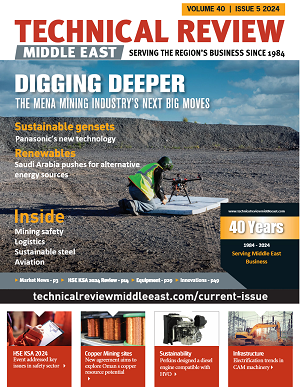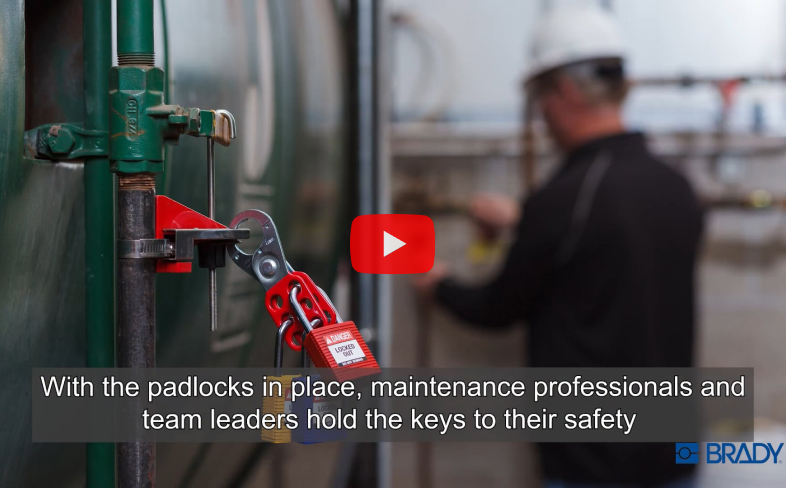In The Spotlight

The facility aligns with the UAE’s “Make it in the Emirates” initiative. (Image source: Schneider Electric)
Arab Development Establishment (ADE) and Schneider Electric have officially launched their joint venture manufacturing facility, TAQANA Energy Solutions, in Abu Dhabi.
Situated in the Industrial City of Abu Dhabi (ICAD), the new facility was inaugurated by His Excellency Omar Al Suwaidi, Undersecretary of the Ministry of Industry and Advanced Technology, alongside key officials, including ADE’s Yousef Mohamad Al Nowais, and senior representatives from Schneider Electric. Notable attendees included Walid Sheta, President of Schneider Electric’s MEA Zone, and Mahmoud Nader, CEO of TAQANA Energy Solutions.
The facility aligns with the UAE’s “Make it in the Emirates” initiative and supports the Abu Dhabi Industrial Strategy (ADIS) to position Abu Dhabi as the region’s leading industrial hub. With objectives like doubling the sector's value to US$48bn by 2031, creating over 13,000 skilled jobs, and boosting international trade, this launch reinforces the UAE's drive to strengthen local industries and global partnerships.
Notable statements
HE Al Suwaidi said, “Public-private-partnerships, especially those that focus on knowledge transfers and technology adoption, are in line with the National Industry and Advanced Technology Strategy, through its contribution to investment across the country. Also, such partnerships solidifies the UAE’s position as a global and regional industrial hub. The collaboration reinforces the country’s status as a competitive and reliable regional and international industrial hub. This project also comes as part of the ongoing cooperation between UAE-based and French companies under the umbrella of the UAE-France Business Council, established to promote business partnerships and launch projects in priority sectors, contributing to sustainable economic development.”
Yousef Mohamed Al Nowais, chairman and managing director, Arab Development Establishment, said, “With the launch of the TAQANA Energy Solutions factory, we are not only supporting the UAE’s industrial sector but also advancing sustainable solutions that are crucial to the future of energy management. Together with Schneider Electric, we are proud to be part of the UAE’s vision for local production, positioning the nation as a leader in the global energy transition.”
Amel Chadli, president of Gulf countries, Schneider Electric, commented, “We are not just manufacturing energy solutions; we are engineering the future of sustainable energy in the UAE and beyond...This milestone highlights Schneider Electric’s unwavering commitment to the UAE, as we support the rapid transformation of the nation’s manufacturing sector and remain dedicated to driving sustainable solutions.”
Mohammed Ali Al Kamali, chief trade and industry officer, ADIO, said, “ By integrating advanced manufacturing technologies and creating high-skilled, knowledge-based jobs, TAQANA is contributing to a robust industrial ecosystem and accelerating our vision of a resilient, diversified economy that sets a new standard for industrial excellence across the region.”
MDS, a manufacturer of specialist screening equipment, has introduced the SCRAPMASTER 400, a powerful new machine tailored to the demands of the scrap and metals recycling industry.
This latest model builds on the robust foundation of the successful M412, which was designed for screening a range of materials, from lightweight substances to heavy demolition waste. After extensive research and customer consultations, MDS has refined the platform to create an ideal solution for scrap metal screening.
The SCRAPMASTER 400 is engineered for heavy-duty scrap processing, featuring a durable, wear-resistant push feeder built to handle abrasive materials, a rugged drum frame with customisable screen options from 25 to 150mm (1–6 inches), and an apron-style conveyor on the oversize material output, enhancing durability specifically for scrap applications.
The machine is equipped with a three-ply, heavy-duty fines belt for added strength, along with auto-reverse functionality and adjustable drum rotation speeds to meet varied processing needs.
Conor Hegarty, general manager MDS, said, “Up until now, many customers have had to rely on traditional recycling trommels or scalpers for the scrap and metal recycling segment, which often lacked the durability required for processing metals. MDS identified the need for a machine specifically dedicated to handling the toughest of tasks.
“MDS products excel in the toughest applications, and we have leveraged our existing heavy-duty technology to produce a machine that improves scrap processing efficiency and reliability. The addition of the SCRAPMASTER 400 to the MDS product range underlines our position as leaders in specialty screening applications.”

Scheduled for completion by the end of 2025, this facility will span a 2,400 sq m. (Image source: MBRAH)
Mohammed Bin Rashid Aerospace Hub (MBRAH) has signed an agreement with Liebherr-Aerospace to establish a new MRO (Maintenance, Repair, and Overhaul) facility at Dubai South.
Scheduled for completion by the end of 2025, this facility will span a 2,400 sq m area within the Aerospace Supply Chain cluster at MBRAH.
Based in Toulouse, France, Liebherr-Aerospace & Transportation SAS—a division of the Liebherr Group—delivers high-quality onboard solutions for aerospace and transportation, promoting sustainability through innovative products and services.
MBRAH, strategically located at Dubai South, serves as a premier free-zone hub offering global connectivity to leading airlines, private jet operators, MROs, and related sectors. This aerospace hub includes maintenance centres and training campuses, aligning with Dubai's goal to be a prominent aviation industry leader.
Tahnoon Saif, CEO of MBRAH, said, “We are pleased to sign this agreement with Liebherr- Aerospace. This partnership underlines our position in attracting the top players in the aviation sector to establish their presence at Dubai South and operate in an integrated economic environment where they can connect with international markets. We will spare no effort in supporting their expansion endeavours, in line with our mandate to solidify and cement Dubai’s position on the world aviation map.”

The investment also supports the development and commercialisation of UIG’s Energy Storage for Resiliency (ESR) platform. (Image source: Volvo Penta)
Expanding on the foundation set by Volvo Penta’s initial investment in 2023, Utility Innovation Group (UIG) is set to amplify its expertise to address the rising demand for adaptable, sustainable electric grid infrastructure.
“This follow-on investment in UtilityInnovation Group reflects our commitment to advancing reliable and efficient electrified power solutions as part of our broader net-zero ambitions,” said Anna Müller, president of Volvo Penta.
UIG’s expertise in data centre power solutions and the evolving grid landscape is further enhanced by the integration of Volvo Penta’s robust BESS subsystems. This collaboration addresses the demand for resilient energy solutions by combining Volvo Group’s advanced technology and global reach with UIG’s deep integration capabilities.
Together, they aim to deliver larger, innovative energy developments for clients, including utilities, data centres, and high-energy users worldwide.
Optimisation technique
The investment also supports the development and commercialisation of UIG’s Energy Storage for Resiliency (ESR) platform, a solution intended to bolster power stability and ease the energy demands of intensive data centres reliant on AI and machine learning, as well as optimise large microgrids.
Additionally, UIG’s GridSure platform leverages data-driven insights and cyber-secure management tools to oversee grid capacity, improve system resilience, and monitor infrastructure comprehensively, ensuring stable and efficient grid operations.
“The investment in UtilityInnovation Group highlights the potential we see in our BESS subsystems for high energy demand sectors,” said Hannes Norrgren, president of Volvo Penta’s Industrial Business. "Entrepreneurial companies like them bring specialised expertise that enhances our capabilities to meet future demands and accelerate time-to-market with pioneering solutions.”
Sidney Hinton, founder and CEO of UIG, added, “We are thrilled to deepen our partnership with Volvo Penta. Their global reach and commitment to sustainability make them an ideal partner as we work to address the critical challenges facing the energy sector today.”
Volvo Penta’s investment in UtilityInnovation Group reinforces its commitment to advancing the global energy transition and highlights its focus on creating sustainable, resilient energy solutions for the future. This transaction does not significantly impact Volvo Group’s financial results or overall financial position.
TAQA has launched its next-generation M4 Inflow Control System. This system allows operators to optimise reservoir performance while sustainably managing fluid production.
The M4 Inflow Control System regulates the flow of unwanted fluids like water and gas, preventing the binary (open/close) effect that can lead to instability or halting production. The system excels in controlling water in ultra-light and light applications and enhances gas production control, offering stability and flexibility across various reservoir conditions.
One of the system’s standout features is its advanced pilot control system, which is highly sensitive to density, making it suitable for a wide range of oil types, including ultra-light, light, medium, and heavy oils. Additionally, its multi-phase control capabilities allow the device to perform efficiently, regardless of its orientation in the wellbore.
Flexibility at sites
TAQA’s M4 Inflow Control System offers seamless ‘plug and play’ integration with its entire portfolio of inflow systems, optimising performance across all well and reservoir types. The design incorporates features such as last-minute capacity adjustments and the ability to circulate to the bottom, ensuring ease of installation and flexibility, even at the rig site.
The system is engineered to maintain an open operating point for oil while being highly restricted for water, based on precise force field analysis confirmed through single and multi-phase flow testing. It has undergone rigorous testing in state-of-the-art multi-phase loops, evaluating the flow behaviour of water, oil, and gas mixtures under various conditions.
Although the system is not limited by oil viscosity, it has performed exceptionally well with oil viscosities as low as 0.5cP, tested alongside water to establish the optimal operating and control points at different water cuts. A comprehensive qualification matrix, including debris, erosion, and cycle testing, has also been completed.
Current market technologies often struggle to control water effectively when oil viscosities drop below 1cP, and there is a risk of turning into a “binary” open-close system, shutting off zones prematurely. TAQA’s new device overcomes both of these issues, ensuring reliable and efficient operation across a range of challenging conditions.
Dr Mojtaba Moradi, subsurface engineering manager of TAQA, said, “With the largest portfolio of inflow control systems more than 20 years of inflow control devices expertise, the M4 Inflow Control System represents the pinnacle of our innovation so far. This new generation offers water control by gradually reducing inflow as water production increases, avoiding premature well shut in.
Its main benefit is precision control based on reservoir production. The device allows operators to maximise output without risking shutting wells in, so they can manage production continuously and efficiently, which translates into obvious financial benefits.”

Wajdi Marroun, managing director of Versatile International. (Image source: Versatile International)
Addressing the issue of rework requires first understanding its root causes. One of the most obvious causes is the size of the project. The bigger the project, the more complicated and challenging it becomes to manage consistency in design and material supply.
Take natural stone, for example, which plays a central role in many of the destination-scale projects in the region. As a natural product, stone has significant variability, making it essential to source the right material to achieve the desired look and durability. As a public-facing product, natural stone requires consistency in appearance and installation.
However, unlike carpet or concrete, its quality as a finished material does not allow for quick fixes. If a mistake is made at the point of production, there are only two options: either to re-source and replace it, which is often costly, or to live with a product that doesn’t reflect the original vision.
Handling a modest volume of natural stone in this way may be straightforward, but overseeing a supply large enough to cover 100 football fields—as is often the case with large-scale projects in the Middle East—is an entirely different matter. Due to the sheer size and complex supply chain of these projects, even minor quality issues can spiral into significant schedule delays and cost overruns.
Cutting rework
Asset owners, who juggle numerous issues simultaneously, often have limited time and resources at their disposal, with little to none dedicated to managing the specific aspects of a project involving stone.
The solution is to engage Stone Project Management Consultants (SPMCs). They serve as trusted partners to asset owners, leveraging their expertise to provide oversight and guidance throughout the entire process, from design to delivery.
From the outset, SPMCs collaborate with architects and designers to identify the best material type that aligns with the project’s vision, design, and budget. They assess quarries within the international stone market, evaluating physical properties like tensile strength and density, and ensuring the availability of high-quality stone. They also screen suppliers to confirm they have the necessary technical credentials and ESG standards for successful project delivery.
In essence, SPMCs work as part of the client team and act as unbiased expert advisors on behalf of the asset owner to oversee the entire procurement and supply chain process.
By implementing standardised quality control and placing engineers and supervisors on-site, SPMCs also manage the entire production process of natural stone on behalf of the asset owners, from quarrying and sample testing to transportation, delivery, dry lay and installation.
This project governance model minimises rework by ensuring materials meet quality standards before shipping. The process also reduces unnecessary quarrying, waste, and energy consumption during production and transportation, supporting the ESG goals of asset owners.
Ultimately, the model prevents project delays and budget overruns, helping asset owners save both time and money.
Versatile International’s ongoing collaboration with Saudi Arabia’s Diriyah Company is a prime example. As the region’s first SPMC, we have partnered with Diriyah on over 50 projects involving natural stone within their US$66bn cultural heritage district. Acting as trusted advisors to Diriyah, we bring our specialised expertise and global network to ensure consistency and quality control throughout the process. By doing so, we have brought the asset owner closer to the point of production, delivering projects with punctuality and precision while minimising the cost of rework.
This article is written by Wajdi Marroun, managing director of Versatile International, a stone project management consultancy. It has been edited for brevity.
Liebherr's strategic expansion in the Middle East has solidified its reputation as a leader in providing top-tier Earthmoving and mining machinery.
Known for our rigorous attention to reliability and innovation, we continue to support the region's infrastructure growth with our advanced earthmoving and mining equipment.
Comprehensive Product Range: Liebherr's portfolio includes crawler and wheeled excavators, wheel loaders, dozers, articulated dump trucks, pipelayers, material handling, crawler loaders and telescopic handlers. Our machines are designed for durability and high performance, making them ideal for the harsh conditions of the Middle Eastern projects.
Technological excellence in equipment: Liebherr's earthmoving equipment exemplifies technological excellence, with each machine optimized for high performance and efficiency. Key features across models like wheeled and crawler excavators, articulated dump trucks, and wheel loaders include advanced hydraulic systems for precise operations, hydrostatic drives reducing fuel consumption and wear, and robust designs tailored to demanding environments. These innovations ensure our equipment meets the rigorous demands of various construction, mining, and landscaping projects, enhancing productivity and sustainability.
Expanding presence in the Middle East region: Liebherr subsidiaries and dealerships in the Middle East region are strategically positioned to ensure effective service and parts availability, thereby ensuring peak performance and minimal downtimes of machines.
Mining sector innovation: Liebherr and Fortescue announce significant expansion of zero emission equipment partnership at MINExpo 2024.
The partnership includes jointly developed technology that paves the way for carbon-free mining and features a total of 475 zero emission Liebherr machines – approximately 360 autonomous battery-electric trucks, 55 electric excavators and 60 battery-powered dozers.
This deal is expected to create one of the world’s largest zero emission mining fleets and represents a breakthrough in the pursuit of a mining industry no longer reliant on fossil fuels.
Customer-centric solutions: At Liebherr, we believe in supporting our clients beyond the sale. Our comprehensive service offerings include expert maintenance, specialised training programs, and responsive customer service, ensuring our clients can leverage the full potential of their equipment.
Liebherr's dedication to the Middle East is reflected in our bespoke solutions, which are designed to address the specific requirements of the region's construction and mining industries. By placing customer support and technological advancement at the forefront of our operations, Liebherr not only guarantees superior machinery but also establishes a partnership that clients can depend on for project success.

The facility aligns with the UAE’s “Make it in the Emirates” initiative. (Image source: Schneider Electric)
Arab Development Establishment (ADE) and Schneider Electric have officially launched their joint venture manufacturing facility, TAQANA Energy Solutions, in Abu Dhabi.
Situated in the Industrial City of Abu Dhabi (ICAD), the new facility was inaugurated by His Excellency Omar Al Suwaidi, Undersecretary of the Ministry of Industry and Advanced Technology, alongside key officials, including ADE’s Yousef Mohamad Al Nowais, and senior representatives from Schneider Electric. Notable attendees included Walid Sheta, President of Schneider Electric’s MEA Zone, and Mahmoud Nader, CEO of TAQANA Energy Solutions.
The facility aligns with the UAE’s “Make it in the Emirates” initiative and supports the Abu Dhabi Industrial Strategy (ADIS) to position Abu Dhabi as the region’s leading industrial hub. With objectives like doubling the sector's value to US$48bn by 2031, creating over 13,000 skilled jobs, and boosting international trade, this launch reinforces the UAE's drive to strengthen local industries and global partnerships.
Notable statements
HE Al Suwaidi said, “Public-private-partnerships, especially those that focus on knowledge transfers and technology adoption, are in line with the National Industry and Advanced Technology Strategy, through its contribution to investment across the country. Also, such partnerships solidifies the UAE’s position as a global and regional industrial hub. The collaboration reinforces the country’s status as a competitive and reliable regional and international industrial hub. This project also comes as part of the ongoing cooperation between UAE-based and French companies under the umbrella of the UAE-France Business Council, established to promote business partnerships and launch projects in priority sectors, contributing to sustainable economic development.”
Yousef Mohamed Al Nowais, chairman and managing director, Arab Development Establishment, said, “With the launch of the TAQANA Energy Solutions factory, we are not only supporting the UAE’s industrial sector but also advancing sustainable solutions that are crucial to the future of energy management. Together with Schneider Electric, we are proud to be part of the UAE’s vision for local production, positioning the nation as a leader in the global energy transition.”
Amel Chadli, president of Gulf countries, Schneider Electric, commented, “We are not just manufacturing energy solutions; we are engineering the future of sustainable energy in the UAE and beyond...This milestone highlights Schneider Electric’s unwavering commitment to the UAE, as we support the rapid transformation of the nation’s manufacturing sector and remain dedicated to driving sustainable solutions.”
Mohammed Ali Al Kamali, chief trade and industry officer, ADIO, said, “ By integrating advanced manufacturing technologies and creating high-skilled, knowledge-based jobs, TAQANA is contributing to a robust industrial ecosystem and accelerating our vision of a resilient, diversified economy that sets a new standard for industrial excellence across the region.”

Scheduled for completion by the end of 2025, this facility will span a 2,400 sq m. (Image source: MBRAH)
Mohammed Bin Rashid Aerospace Hub (MBRAH) has signed an agreement with Liebherr-Aerospace to establish a new MRO (Maintenance, Repair, and Overhaul) facility at Dubai South.
Scheduled for completion by the end of 2025, this facility will span a 2,400 sq m area within the Aerospace Supply Chain cluster at MBRAH.
Based in Toulouse, France, Liebherr-Aerospace & Transportation SAS—a division of the Liebherr Group—delivers high-quality onboard solutions for aerospace and transportation, promoting sustainability through innovative products and services.
MBRAH, strategically located at Dubai South, serves as a premier free-zone hub offering global connectivity to leading airlines, private jet operators, MROs, and related sectors. This aerospace hub includes maintenance centres and training campuses, aligning with Dubai's goal to be a prominent aviation industry leader.
Tahnoon Saif, CEO of MBRAH, said, “We are pleased to sign this agreement with Liebherr- Aerospace. This partnership underlines our position in attracting the top players in the aviation sector to establish their presence at Dubai South and operate in an integrated economic environment where they can connect with international markets. We will spare no effort in supporting their expansion endeavours, in line with our mandate to solidify and cement Dubai’s position on the world aviation map.”
























































